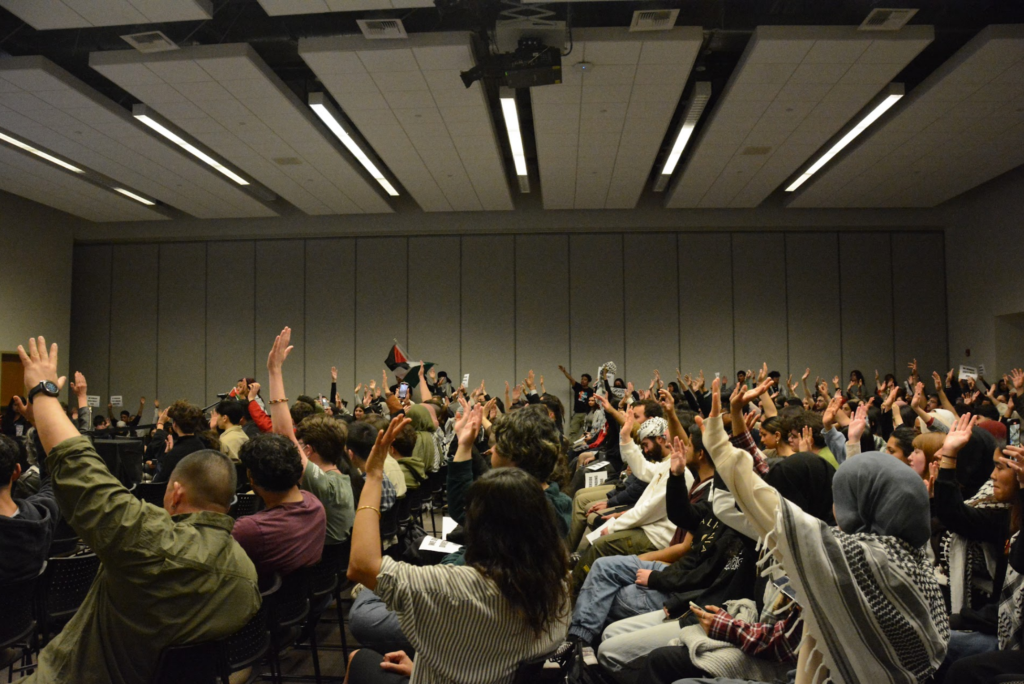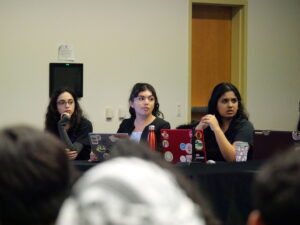
The unanimous vote, 15-0-0, came in an emotionally charged ASUCR Senate meeting that drew hundreds of attendees and dozens of speakers for public forum. Supporters of the legislation filled HUB 302 North, which was expanded during the meeting to fit capacity. Alumni, faculty, graduate and undergraduate students voiced their support of the legislation, drawing from personal stories, historical precedent and appealing to senators’ morality.
“I implore you, I no longer want to be complicit in the bombings of my family,” expressed Students for Justice in Palestine (SJP) President Hibah Nassar, who has family in Gaza. “We demand our senators to vote ‘yes.’”
SR-W24-005, entitled, ASUCR Boycott and Divestment from Israel and Corporations Complicit in the Ongoing Genocide in Gaza, “seeks to address the human rights violations of the nation-state and government of Israel and establish a guideline for ethical spending.” The legislation bases its guidelines on the Boycott, Divestment and Sanctions (BDS) movement, which lists companies to boycott “in an attempt to pressure the Israeli government to abide by international law and put an end to its genocidal and apartheid policies.” Through this resolution, “no ASUCR funds shall be committed to the purchase of products” from the BDS List.
The resolution calls for collective action to “advocate for a halt to such grave violation of human rights” in Gaza taken by Israel. It also cites various scholars and practitioners who have “applied definitions of concepts such as “genocide, ethnic cleansing, apartheid and occupation to the situation within Palestine.” The document takes note of UC policy that prohibits discrimination and accuses UCR administration of having “refused to condemn or recognize its complicity in Zionist settler colonialism, genocide and apartheid.”

Image via Mamata Elangovan / The Highlander
The legislation faced opposition from Hillel, a student organization on campus. Naum Yankelvich, secretary of the club, and second-year biology major, spoke on behalf of the organization during the meeting. The day after the meeting, he shared that “The goal [of speaking during the meeting] wasn’t to make it so that the resolution doesn’t pass. It was just to get it on the record that this resolution came about in a very un-ASUCR-like way. We found out about [the legislation] less than a week before the vote.” From his perception of the process, Yankelvich claimed that “[the legislation] apparently was created less than a week before the vote.”
For Hillel’s next steps, they plan on “going to try and talk to school officials who would be responsible for going through with that resolution and the next steps of the bureaucracy. We’re going to try to talk to them and voice our concerns. Hopefully, further down the line [the legislation] gets shut down.”

Image via Senna Omar / The Highlander
While concerns were brought up about how long it took for the bill to be drafted and presented to the ASUCR Senate, Senator Haidar explained that “there is no baseline typical timeline of a resolution or bill because it depends on what the resolution and bill is for.” She elaborated, in the case of this divestment legislation, “a lot of the content of the resolution and bill came almost directly from UC Davis. So that is why it may seem like a shorter timeline because we had a lot of those materials prepared for us.” Due to the previous legislation drafted and approved by UCD, it meant that “a good portion of [the resolution] was already completed.”
Prior to the legislation being brought to the Senate during the ASUCR meeting, it was approved by the Legislative Review Committee of ASUCR on Friday, Feb. 22, 2024 at 3 p.m. In regards to the length of time it took to create, edit and review the legislation, Senator Haidar shared that it took a “few weeks.”
Due to ASUCR’s nature as an autonomous organization on campus, they have the ability to have their own governing documents and act without interference from administration on campus, as long as it is legally allowed and abides by campus policies. Senator Haidar claimed that she “[doesn’t] think administration had any power in telling us what to do or how to operate when it comes to things we do internally.”
Many other on-campus organizations such as Muslim Student Association (MSA), Young Democratic Socialists for America, Providing Opportunities, Dreams and Education in Riverside (PODER), had the opportunity to share support of the resolution as secondary authors. According to Senator Haidar, Hibah Nassar, her co-author in the bill, reached out directly to different organizations on campus and explained to them what the resolution entailed for their clubs and organizations. She elaborated on the information that Nassar provided, claiming that, “there was a lot of transparency involved … that’s why we made such a point of reaching out to clubs and orgs directly to ensure that this is something that they support.”

Image via Senna Omar / The Highlander
Some students were confused by the information presented by the resolution and were unsure of what it entailed. A few were confused as to whether the resolution would extend to administration. Others wondered if it meant that the divestment would be applied immediately. Senator Haidar clarified, “the biggest misconception of the bill is that this will apply to administration. As much as I, as an ASUCR representative, would love to have our diverse voices heard to that extent, and demand action from administration. This is separate.”
The legislation would apply only to ASUCR funding, so any funding a club or organization on campus receives from ASUCR would be impacted. This includes grants or allocations they received from ASUCR. While this is the case, the legislation will not go into effect overnight. By spring of 2024, ASUCR will create a new policy to set guidelines on the matter of ethical spending and maintain a list of boycotted vendors and corporations, notify student organizations and clubs prior to the adoption of these policies and then implement the policy by fall of 2024.
In a statement released March 1, 2024, the day after the Senate meeting,UCR administration voiced their opposition to the Senate legislation. “This resolution runs counter to UC Riverside’s longstanding position and practices, does not align with the university’s views, and does not affect the investment practices of the university. We strongly oppose this action and believe that it goes against the culture of open dialogue and discourse.”

Image via Senna Omar / The Highlander
Senator Haidar expressed that ASUCR expected a response like this from the University in regard to the bill and resolution. “We were of the understanding that administration was not going to be on our side. And this is not something that we are going to be able to reason with administration prior to its passing.” Due to this sentiment, it made it a necessity for ASUCR to “show that this is something the students wanted.” Senator Haidar points out how “we had around 500 students at that Senate meeting. We know that this is something that the student body wants.”
Similar to UCR News, Hillel, on their Instagram page, released a statement sharing that they are “deeply disappointed that ASUCR voted to adopt a hateful resolution that demonizes Israel and further targets and marginalizes the Jewish community at UCR. Antisemitism has no place in our community, and we are offering support to all students impacted by the decision.”
However, Senator Haidar shared her sentiment that “This is not a resolution to incite hate. This is not meant to be hateful or to incite any kind of anti-Semitism or discrimination in any way. I would not sign my name on this, if I thought this was anti-Semitic.”










